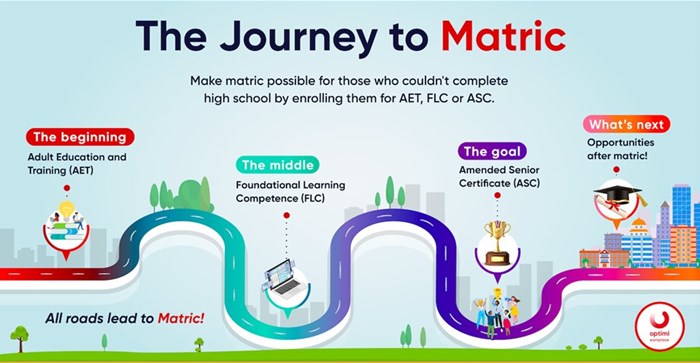A matric, sometimes known as a National Senior Certificate (NSC), is an entry-level requirement for almost every college or university application, and for professional positions, too. Even those who do find work without a matric are less likely to be promoted, and entrepreneurs interested in running their own companies often find it difficult to secure venture capital.
This has far-reaching ramifications. It makes intergenerational cycles of poverty harder to break within families, communities, and nations, and slows economic progress at every level. Since poverty has an inverse relationship to education, developing our people means developing our country as a whole.
If you want to defy the odds, beat the statistics and achieve your matric, there is hope. Whether you’re a job seeker or an employee trying to better your chances, or an employer striving to upskill your team members (and add points to your B-BBEE scorecard in the process), there are several options available to you.
These options pave the way to your journey to matric.

Adult education and training (AET) is the beginning and one of the best places to start if you’re trying to establish a foundation of lifelong learning and enable access to further education. AET Levels 1 to 3 are designed to prepare learners for the General Education and Training Certificate (GETC), which is registered at NQF Level 1. The GETC then places learners on the track to further learning opportunities. It’s designed to equip you with the essential basics you need to choose a vocational route and seek out occupational-specific qualifications.
Once your AET is complete, a foundational learning competence (FLC) qualification provides you with critical skills in communication and mathematical literacy. It’s suitable for any adult who wants to progress with occupational learning between NQF Levels 2 and 4. Ideally, you should hold an AET Level 3 in communication and mathematical literacy before you start the FLC.
Of course, the ultimate goal is to secure your matric, since it serves as an entry-level requirement for many colleges, universities, and professional positions. The amended senior certificate (ASC), which is registered at NQF Level 4, is the equivalent of the NSC. To write it, you need to be 21 years old or older with an incomplete senior certificate qualification. Once you have it in hand, your chances of qualifying for tertiary study or finding employment are that much higher.
This Mandela Month, Optimi Workplace is calling on organisations to put their employees back on track academically and professionally by helping them achieve their matric. From AET to FLC and ASC, employees and community members can be registered for any part of their matric journey through Optimi Workplace.
During July, in celebration of Mandela’s legacy, Optimi Workplace is committed to offering free essential computer skills training to every learner registered for a course on the journey to matric. All roads lead to matric in July with #Matric4Madiba.
To learn more about this promotion, get in touch with az.oc.imitpo@eoges.olemehp or visit Optimi Workplace.